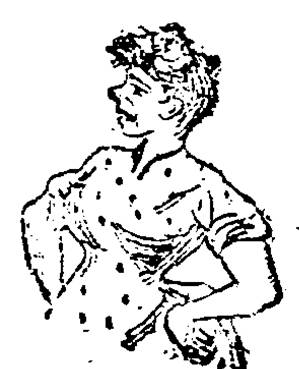This article has been transcribed from a copy of the Cardiff Times in the online collection of scanned Welsh newspapers 1804-1919 in the National Library of Wales, with grateful recognition of the free access accorded to all readers. Paragraph breaks have been introduced for easier reading. This page is badly damaged in the original and much of this article is lost.
This article discusses what was later called ‘the servant problem,’ which was often a subject of cartoons in Punch, Judy, Fun, and other magazines. In 1889, the year this article appeared in the Cardiff Times,

A ‘page’ that entails quite a ‘chapter’ of accidents, and who certainly ought to turn over a new ‘leaf.’
great deal is said and written now and again about what is termed ‘The Dearth of Servants.’ Where does this ‘dearth’ come from, sir, I wonder, even in this manufacturing district, where girls, when their ideas are not too elevated even for that, prefer to ‘wark at t’mill’ or to go tailoring (and consequently to enjoy a greater amount of liberty to go galivanting at nights) rather than to live in a good and thoroughy well-provided home and be under the almost constant authority of a mistress? There is no dearth of servants, sir, but there is a decided dearth of good servants. There are any amount of young persons to be had of the order which is ‘cheeky’ on the slightest or no provocation, which is never happy except it is ‘out,’ or exchanging gossipy items with the other young person next door, which is the more unreasonable the better you treat it, and which brushes dust under the hearthrug, omits to wash between the prongs of forks, and which is infin[i]tely more dainty as to its victuals than are its betters. I have seen a great variety of young persons whose domain was the kitchen, and as I am credited in a house with being of a somewhat ‘soft’ and placable disposition, I have been their constant victim. In fact, I have found out, sir – and I say it in all seriousness – that the more polite and considerate I have been to the British servant girl – when she has been of immature years especially – the more have I been what she would call, were she the sufferer, ‘put upon.’ When I have been left entirely in her tender mercies my boots have been ‘browned’ rather than ‘blacked,’ my morning toast has been blacked, or left in a sort of piebald condition, rather than browned, and I have been done brown on both sides in regard to moneys required for petty household expenses. My bath has been a towelless one, and I have had to dry myself on the door mat, or not at all; my washhandstand has been soapless; my cruetstand at every meal has seemed to ever lack the condiment that I most particularly required; my coal scuttle has been an empty mockery; the bell has refused to ring; I have been left the sole tenant of the house for several hours whilst ‘Mary Jane’ went ‘round the corner’ only to buy some trifle; my toothbrush has disappeared for several days at a stretch; my [po]made has also melted away in a most unaccountable manner, and has returned a mere shadow of its former self, and very black and dirty-looking into the bargain; and I have found that a pair of long-nosed pliers manipulated by my hand-maiden has quite done away with the necessity for me to hand over to her the key of the beer-barrel – especially if, according to her own declaration, she ‘couldn’t abide’ beer. It has been the case, sir, that when any servant I have known couldn’t ‘abide’ beer, beer could never abide with her. Years and years ago I [……..]

The ‘gal’ who ups and gives ‘missis cheek.’
[…] out to spend the evening, who didn't particul[arly] care to find the fac simile impressions of [my] domestic's grimy thumb [i]n his best and m[ost] prized book – I have even known harsh, unthinking people who have regarded the average servant girl as she at present exists as a veritable nuisance, but, unluckily, according to the present state of our domestic economy, a necessary one.
Links to Related Material on the “Servant Problem”
- George Moore’s Esther Waters As a New Woman Novel
- George Moore’s Esther Waters and Tess of the d'Urbervilles
- Fun on Servants and the Sermon Problem
Last modified 23 February 2022